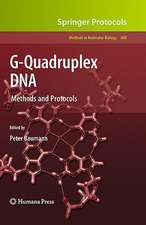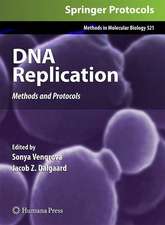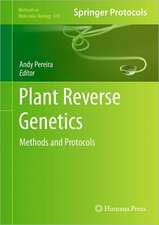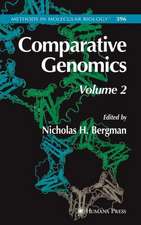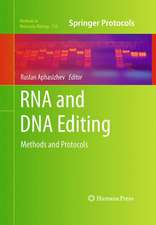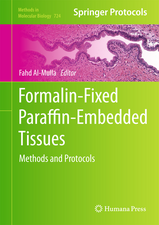Directed Enzyme Evolution: Screening and Selection Methods: Methods in Molecular Biology, cartea 230
Editat de Frances H. Arnold, George Georgiouen Limba Engleză Hardback – 16 mai 2003
| Toate formatele și edițiile | Preț | Express |
|---|---|---|
| Paperback (1) | 948.47 lei 6-8 săpt. | |
| Humana Press Inc. – 10 noi 2010 | 948.47 lei 6-8 săpt. | |
| Hardback (1) | 957.32 lei 6-8 săpt. | |
| Humana Press Inc. – 16 mai 2003 | 957.32 lei 6-8 săpt. |
Din seria Methods in Molecular Biology
- 9%
 Preț: 791.59 lei
Preț: 791.59 lei - 23%
 Preț: 598.56 lei
Preț: 598.56 lei - 20%
 Preț: 882.95 lei
Preț: 882.95 lei -
 Preț: 252.04 lei
Preț: 252.04 lei - 5%
 Preț: 802.69 lei
Preț: 802.69 lei - 5%
 Preț: 729.61 lei
Preț: 729.61 lei - 5%
 Preț: 731.43 lei
Preț: 731.43 lei - 5%
 Preț: 741.30 lei
Preț: 741.30 lei - 5%
 Preț: 747.16 lei
Preț: 747.16 lei - 15%
 Preț: 663.45 lei
Preț: 663.45 lei - 18%
 Preț: 1025.34 lei
Preț: 1025.34 lei - 5%
 Preț: 734.57 lei
Preț: 734.57 lei - 18%
 Preț: 914.20 lei
Preț: 914.20 lei - 15%
 Preț: 664.61 lei
Preț: 664.61 lei - 15%
 Preț: 654.12 lei
Preț: 654.12 lei - 18%
 Preț: 1414.74 lei
Preț: 1414.74 lei - 5%
 Preț: 742.60 lei
Preț: 742.60 lei - 20%
 Preț: 821.63 lei
Preț: 821.63 lei - 18%
 Preț: 972.30 lei
Preț: 972.30 lei - 15%
 Preț: 660.49 lei
Preț: 660.49 lei - 5%
 Preț: 738.41 lei
Preț: 738.41 lei - 18%
 Preț: 984.92 lei
Preț: 984.92 lei - 5%
 Preț: 733.29 lei
Preț: 733.29 lei -
 Preț: 392.58 lei
Preț: 392.58 lei - 5%
 Preț: 746.26 lei
Preț: 746.26 lei - 18%
 Preț: 962.66 lei
Preț: 962.66 lei - 23%
 Preț: 860.21 lei
Preț: 860.21 lei - 15%
 Preț: 652.64 lei
Preț: 652.64 lei - 5%
 Preț: 1055.50 lei
Preț: 1055.50 lei - 23%
 Preț: 883.85 lei
Preț: 883.85 lei - 19%
 Preț: 491.88 lei
Preț: 491.88 lei - 5%
 Preț: 1038.84 lei
Preț: 1038.84 lei - 5%
 Preț: 524.15 lei
Preț: 524.15 lei - 18%
 Preț: 2122.34 lei
Preț: 2122.34 lei - 5%
 Preț: 1299.23 lei
Preț: 1299.23 lei - 5%
 Preț: 1339.10 lei
Preț: 1339.10 lei - 18%
 Preț: 1390.26 lei
Preț: 1390.26 lei - 18%
 Preț: 1395.63 lei
Preț: 1395.63 lei - 18%
 Preț: 1129.65 lei
Preț: 1129.65 lei - 18%
 Preț: 1408.26 lei
Preț: 1408.26 lei - 18%
 Preț: 1124.92 lei
Preț: 1124.92 lei - 18%
 Preț: 966.27 lei
Preț: 966.27 lei - 5%
 Preț: 1299.99 lei
Preț: 1299.99 lei - 5%
 Preț: 1108.51 lei
Preț: 1108.51 lei - 5%
 Preț: 983.72 lei
Preț: 983.72 lei - 5%
 Preț: 728.16 lei
Preț: 728.16 lei - 18%
 Preț: 1118.62 lei
Preț: 1118.62 lei - 18%
 Preț: 955.25 lei
Preț: 955.25 lei - 5%
 Preț: 1035.60 lei
Preț: 1035.60 lei - 18%
 Preț: 1400.35 lei
Preț: 1400.35 lei
Preț: 957.32 lei
Preț vechi: 1167.45 lei
-18% Nou
Puncte Express: 1436
Preț estimativ în valută:
183.19€ • 191.74$ • 152.47£
183.19€ • 191.74$ • 152.47£
Carte tipărită la comandă
Livrare economică 01-15 aprilie
Preluare comenzi: 021 569.72.76
Specificații
ISBN-13: 9781588292865
ISBN-10: 158829286X
Pagini: 404
Ilustrații: XV, 383 p.
Dimensiuni: 152 x 229 x 30 mm
Greutate: 0.79 kg
Ediția:2003
Editura: Humana Press Inc.
Colecția Humana
Seria Methods in Molecular Biology
Locul publicării:Totowa, NJ, United States
ISBN-10: 158829286X
Pagini: 404
Ilustrații: XV, 383 p.
Dimensiuni: 152 x 229 x 30 mm
Greutate: 0.79 kg
Ediția:2003
Editura: Humana Press Inc.
Colecția Humana
Seria Methods in Molecular Biology
Locul publicării:Totowa, NJ, United States
Public țintă
ResearchCuprins
Genetic Selections.- Genetic Complementation Protocols.- Use of Pol I-Deficient E. coli for Functional Complementation of DNA Polymerase.- Selection of Novel Eukaryotic DNA Polymerases by Mutagenesis and Genetic Complementation of Yeast.- Autogene Selections.- Selection for Soluble Proteins via Fusion with Chloramphenicol Acetyltransferase.- Proside.- Minimization of Proteins by Random Fragmentation and Selection.- Screens for Enzymes.- Evaluating a Screen and Analysis of Mutant Libraries.- Screening Mutant Libraries in Saccharomyces cerevisiae.- Solid-Phase Screening Using Digital Image Analysis.- Screening for Thermostability.- High-Throughput Screening of Mutant ?-Amylase Libraries for Increased Activity at 129°C.- High-Throughput Carbon Monoxide Binding Assay for Cytochromes P450.- High-Throughput Screen for Aromatic Hydroxylation.- Colorimetric Screen for Aliphatic Hydroxylation by Cytochrome P450 Using p-Nitrophenyl-Substituted Alkanes.- High-Throughput Screens Based on NAD(P)H Depletion.- High-Throughput Tetramethylbenzidine (TMB) Screen for Peroxidases.- Screen for Oxidases by Detection of Hydrogen Peroxide with Horseradish Peroxidase.- Colorimetric Dehydrogenase Screen Based on NAD(P)H Generation.- Colorimetric Assays for Screening Laccases.- pH Sensing Agar Plate Assays for Esterolytic Enzyme Activity.- A pH-Indicator-Based Screen for Hydrolytic Haloalkane Dehalogenase.- Detection of Aromatic ?-Hydroxyketones with Tetrazolium Salts.- Selection of Heat-Stable Clostridium cellulovorans Cellulases After In Vitro Recombination.- Screening and Selection Strategies for Disulfide Isomerase Activity.- An Overview of High-Throughput Screening Systems for Enantioselective Enzymatic Transformations.- Select Protocols of High-Throughput ee-Screening Systems forAssaying Enantioselective Enzymes.- Directed Evolution of the Substrate Specificities of a Site-Specific Recombinase and an Aminoacyl-tRNA Synthetase Using Fluorescence-Activated Cell Sorting (FACS).- Calmodulin-Tagged Phage and Two-Filter Sandwich Assays for the Identification of Enzymatic Activities.- High-Throughput FACS Method for Directed Evolution of Substrate Specificity.- Improving Protein Folding Efficiency by Directed Evolution Using the GFP Folding Reporter.
Recenzii
"...covers a considerable number of protocols for a broad range of enzymes...very useful..." - ChemBioChem
Textul de pe ultima copertă
Directed evolution, the application of evolutionary design to enzyme engineering, requires effective screening strategies to isolate those proteins that perform a desired function from the libraries generated by the techniques. In Directed Enzyme Evolution: Screening and Selection Methods, seasoned practitioners from many leading laboratories describe their leading and readily reproducible screening strategies for isolating useful clones. These techniques have been optimized for sensitivity, high throughput, and robustness, and are of proven utility for directed evolution purposes. The assays presented use a variety of techniques, including genetic complementation, microtiter plates, solid-phase screens with colorimetric substrates, and flow cytometric screens. There are also representative examples of how phage libraries may be interrogated for enzymatic activity. Each protocol contains detailed step-by-step instructions and many notes on how best to deal with the problems that may occur. An accompanying volume, Directed Evolution Library Creation: Methods and Protocols (ISBN 1-58829-285-1), describes readily reproducible methods for the creation of mutated DNA molecules and DNA libraries.
Taken together, Directed Enzyme Evolution: Screening and Selection Methods and Directed Evolution Library Creation: Methods and Protocols capture for newcomers and more experienced investigators alike all the key methods for using directed protein evolution to better understand protein structure-function relationships, to discover new enzymes and therapeutic proteins, and to design new assays suitable for specific applications.
Taken together, Directed Enzyme Evolution: Screening and Selection Methods and Directed Evolution Library Creation: Methods and Protocols capture for newcomers and more experienced investigators alike all the key methods for using directed protein evolution to better understand protein structure-function relationships, to discover new enzymes and therapeutic proteins, and to design new assays suitable for specific applications.
Caracteristici
Includes supplementary material: sn.pub/extras












